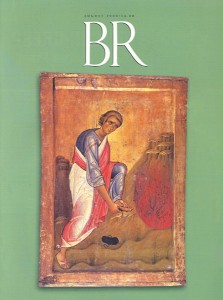Judges 6:6–11
Sidebar to: Combine the Best from Each Tradition
Most scholars agree that Judges 6:7–10, outlined in blue on this page from the Leningrad Codex (below right), is an editorial insertion into an earlier version of the biblical text. As one can see from the spacing in the Leningrad Codex, even the Masoretes set these verses off from the rest of the passage (see the first sidebar in “Keep Each Tradition Separate”, which shows the same passage as it appears in a modern scholarly version based on the MT).
According to Hendel, the Dead Sea Scroll fragment 4QJudga (below left) represents an earlier moment in the transmission of the text. Lacking the inserted verses altogether, the text on the fragment (highlighted in yellow) goes immediately from Judges 6:6, on one line, to Judges 6:11, on the next. For purposes of comparison, the end of verse 6 and verse 11 are also highlighted in yellow on the folio from the Leningrad Codex. For Hendel, this demonstrates graphically how the later insertion interrupts the flow of the more original version, which, as Hendel points out, follows a familiar narrative pattern found throughout the Book of Judges: transgression and retribution followed by forgiveness and deliverance.
Already a library member? Log in here.
Institution user? Log in with your IP address.

